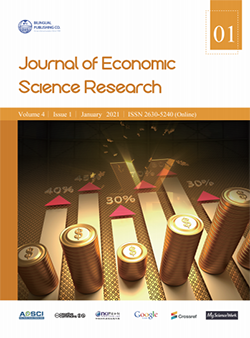Dynamic Pricing Research for Container Terminal Handling Charges based on Demand Forecast
DOI:
https://doi.org/10.30564/jesr.v4i1.2696Abstract
A dynamic pricing model was established based on forecasting the demand for container handling of a specific shipping company to maximize terminal profits to solve terminal handling charges under the changing market environment. It assumes that container handling demand depends on the price and the unknown parameters in the demand model. The maximum quasi-likelihood estimation(MQLE) method is used to estimate the unknown parameters. Then an adaptive dynamic pricing policy algorithm is proposed. At the beginning of each period, through dynamic pricing, determining the optimal price relative to the estimation value of the current parameter and attach a constraint of differential price decision. Meanwhile, the accuracy of demand estimation and the optimality of price decisions are balanced. Finally, a case study is given based on the real data of Shanghai port. The results show that this pricing policy can make the handling price converge to the stable price and significantly increase this shipping company’s handling profit compared with the original “contractual pricing” mechanism.
Keywords:
Container; Terminals handling charges; Dynamic pricing; Adaptive pricing; MQLEReferences
[1] Yi Ding, Kaimin Chen, Dongmin Xu. Dynamic pricing research for container terminal handling charge[J]. Maritime Policy & Management, 2020.
[2] Yi Ding, Kaimin Chen, Guolong Lin. Cost apportioning and discount pricing for container terminal handling operation[J]. Journal of Shanghai Maritime University, 2017, 38(02): 22-28. (in Chinese)
[3] Meersmn H, Strandenes S P, Eddy V D V. Port pricing: principles, structure and models[J]. Social Science Electronic Publishing, 2014.
[4] Khalld Bichou. Port Operations,Planning and Logistics[M]. Information Law from Routledge, 2013, 121-134.
[5] Aijun Jia. Study on the Price management mechanism of Bulk Cargo in Tianjin Port[D]. Jilin University, 2012:5-10. (in Chinese)
[6] Zhaogang Wang. Study on container handling pricing and management in L port[D]. Yangzhou University, 2017: 3-7. (in Chinese)
[7] Yu Jue, Ding Yi, Lin Guolong. The Strategy of Dynamic Pricing of Handling Operation for Port Container based on Q-Learning[J]. Computer Applications and Software, 2018, 35(12):123-130+221. (in Chinese)
[8] Arnoud V. den Boer. Dynamic pricing and learning: Historical origins, current research, and new directions[J]. Surveys in Operations Research and Management Science, 2015, 20(1).
[9] Lieberman W H. Pricing and Revenue Optimization: Maximizing Staff Effectiveness[M]. Revenue Management, 2011.
[10] Kalyanam K. Pricing Decisions Under Demand Uncertainty: A Bayesian Mixture Model Approach[M]. 1996.
[11] Bertsias D, Perakis G. Dynamic Pricing: A Learning Approach[J]. 2001.
[12] Levina, T, Levin, Y, McGill, J. Dynamic Pricing with Online Learning and Strategic Consumers: An Application of the Aggregating Algorithm[J]. 2010, 57(2): 327-341.
[13] Boer A V D, Zwart B. Simultaneously Learning and Optimizing Using Controlled Variance Pricing[M]. Informs, 2014.
[14] Den Boer, Arnoud V. Dynamic Pricing with Multiple Products and Partially Specified Demand Distribution[J]. Mathematics of Operations Research, 2014, 39(3).
[15] Tian Xia, Xueren Wang. Strong consistency of maximum Quasi-Likelihood estimators in nonlinear quasi-likelihood models with adaptive design[J]. Mathematics in Practice and Theory, 2015, 45(21): 252- 258. (in Chinese)
Downloads
Issue
Article Type
License
Copyright and Licensing
The authors shall retain the copyright of their work but allow the Publisher to publish, copy, distribute, and convey the work.
Journal of Economic Science Research publishes accepted manuscripts under Creative Commons Attribution-NonCommercial 4.0 International License (CC BY-NC 4.0). Authors who submit their papers for publication by Journal of Economic Science Research agree to have the CC BY-NC 4.0 license applied to their work, and that anyone is allowed to reuse the article or part of it free of charge for non-commercial use. As long as you follow the license terms and original source is properly cited, anyone may copy, redistribute the material in any medium or format, remix, transform, and build upon the material.
License Policy for Reuse of Third-Party Materials
If a manuscript submitted to the journal contains the materials which are held in copyright by a third-party, authors are responsible for obtaining permissions from the copyright holder to reuse or republish any previously published figures, illustrations, charts, tables, photographs, and text excerpts, etc. When submitting a manuscript, official written proof of permission must be provided and clearly stated in the cover letter.
The editorial office of the journal has the right to reject/retract articles that reuse third-party materials without permission.
Journal Policies on Data Sharing
We encourage authors to share articles published in our journal to other data platforms, but only if it is noted that it has been published in this journal.




 Wenxiu Wang
Wenxiu Wang

